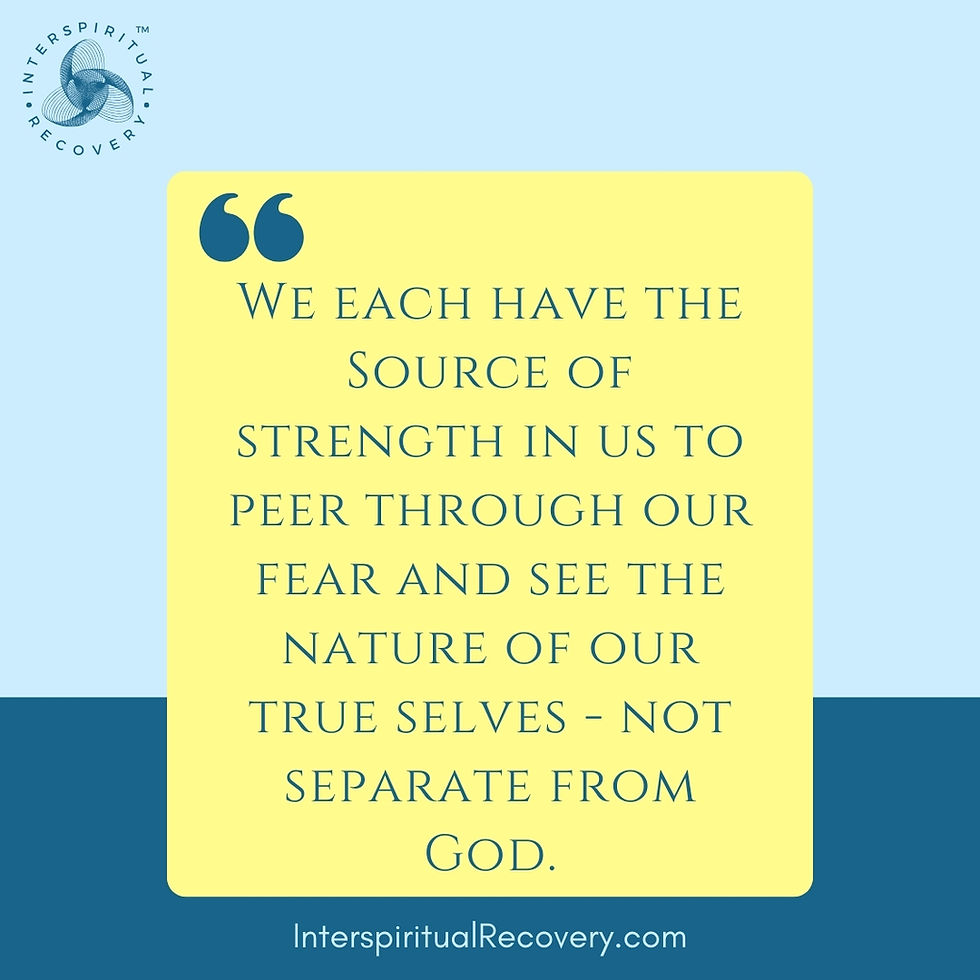Transcending Fear to Discover Our True Nature: Not Separate from God
- Patrick Webster
- Aug 25, 2024
- 3 min read
In our journey through life, fear often acts as a shadow, covertly guiding our actions and distorting our perception of reality. Fear, whether it appears as anxiety about the future, attachment to the past, or a deep-seated sense of inadequacy, clouds the ultimate truth of our existence: that we are not separate from God, but rather inextricably joined at the ground of our being.
We find that both Eastern and Western spiritual traditions can have very similar methods and practices for recognizing and dealing with the fears that block us from realizing the nature of our true selves. In Buddhism we engage in a practice of developing an understanding of and transcendence of fear. According to the Buddha's teachings, one of the roots of fear is a lack of knowing—particularly, the ignorance of our true nature. This ignorance is one of the primary causes of dukkha (suffering, discontent or dissatisfaction). Living with this fear, this ignorance, causes us to engage in a mistaken belief in a separate, isolated self, which clings to our desires and our fears of inevitable losses.
In Buddhism, the path to overcoming fear lies in the cultivation of prajña (wisdom or insight) and karuna (compassion). By contemplating the impermanence of all things (anicca), the absence of an independent self (anatta), and the interconnectedness of everything, we begin to let go of the illusions that give rise to fear. As our illusions fade, we come to see that our true nature is not bound by our limited ideas but is instead a part of the vastness of creation.

The teachings of Meister Eckhart, a 13th-century Dominican theologian and mystic, resonate deeply with the Buddhist understanding of transcending fear through the realization of our true nature. Eckhart spoke of a "divine spark" within each of us, an essence that is one with God. He emphasized that the goal of the spiritual life is to let go of the false self—the "thinking" that clings to fear, desires, and separation—and to discover this divine essence within.
Eckhart taught that by emptying ourselves of attachments and fears, we can experience a profound union with God. In perhaps one of his most well known statements he said, "The eye with which I see God is the same eye with which God sees me." This thought underscores the non-dual nature of our true self; in our ultimate reality, there is no separation between us and God. Any separation we sense or feel is an illusion created by our own thinking (perceptions, fears, etc) influenced by whatever experiences we've lived and our reactions to them.
To transcend fear, according to Eckhart, is to surrender the ego and its illusions. In this surrender, we do not lose ourselves but rather discover our true nature as a manifestation of God's infinite love and wisdom. Fear dissolves in the light of this realization, as we come to understand that our true being is "eternally united with the divine".
The Journey of Realizing Our Oneness
The teachings of both Buddhism and Meister Eckhart invite us to embark on a spiritual journey—a journey that invites us to face and transcend our fears. This path is not about denial or suppression of fear but about seeing it for what it truly is: a product of our own limited understanding.
By cultivating mindfulness and meditation, as taught in many Eastern and some Western traditions, we develop the clarity to see through the illusions that fuel our fears. And by embracing the mystical insights of Eckhart, we open ourselves to the experience of divine union, recognizing that our true self is inseparable from God.
In this realization, fear loses its power over us. We begin to live from a place of deep trust and love, knowing that we are not isolated beings struggling against the world but rather expressions of the divine, intrinsically connected to all that is.
As we walk this path, fear transforms from a barrier into a teacher, guiding us toward the ultimate realization of our oneness with all that is. In this state of divine unity, we find peace, freedom, and a boundless capacity for love, both for ourselves and for the world around us.
%20(5).png)



Comments